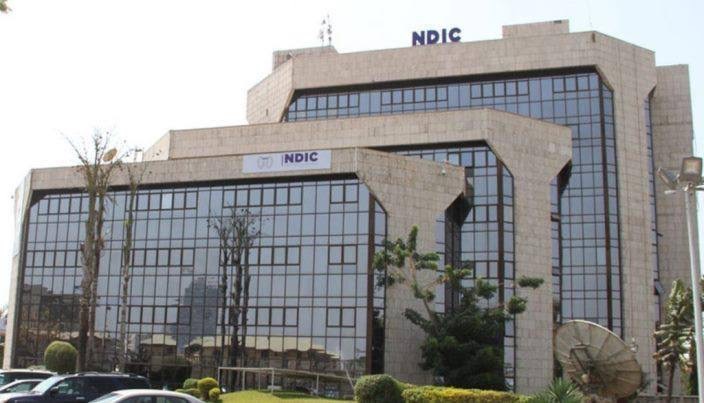Nigeria’s deposit insurance funds is now in excess of N2 trillion and gives the Nigeria Deposit Insurance Corporation (NDIC) the ‘firepower’ to take on the new maximum deposit insurance coverage levels for all licensed deposit-taking financial institutions which, it substantially jerked up on Thursday.
The money is made up of current balances in all the four deposit insurance funds managed by the NDIC including, the Deposit Money Banks (DMBs); Primary Mortgage Banks and microfinance banks; non interest banks; and the payment service banks.
Bello Hassan, Managing Director/Chief Executive, NDIC disclosed this in Abuja at a press conference where he equally announced the corporation’s decision to adjust with immediate effect, the maximum deposit insurance coverage for Deposit Money Banks (DMBs) was moved up substantially from N500,000 to N5,000,000, would provide full coverage of 98 98% of the total depositors compared with the current cover of 89.20%.
In terms of the value of deposit covered, the revised coverage would increase the value of deposits covered by deposit insurance to 25.37% compared with the current cover of 6.31% of total value of deposits.

For Microfinance Banks (MFBs) the coverage was moved from N200,000 to N2,000,000, and would provide full coverage of 99.27% of the total depositors compared with the current level of 98.76% and would increase the value of deposits covered by deposit insurance to 34.43% compared with 14.38% of total value of deposit, currently covered
For the Primary Mortgage Banks (PMBs), there is an increase of the maximum deposit insurance coverage from N500,000 to N2,000,000 which would provide full coverage of 99.34% of the total depositors compared with the current 97.98%. It would increase the value of deposits covered by deposit insurance to 21.04% compared with 10.77% of total value of deposit, currently covered.
Also for Payment Service Banks (PSBs), the maximum deposit insurance coverage want raised from N500,000 to N2,000,000 and is expected to provide full coverage of 99.99% of the total number of depositors and would increase the value of deposits covered by deposit insurance to 43.10% of the total value deposits from the current cover of 40.60%.
For Subscribers of Mobile Money Operators, their maximum Pass-through deposit insurance coverage was equally raised from N500,000 to N5,000,000 per subscriber per MMO as the applicable coverage level for depositors of DMBs.
“The adoption of the revised maximum deposit insurance coverage is supported by the Corporation’s current funding, represented by the balances in the various Deposit Insurance Funds (DIFs), expected annual premium collection, enhanced supervision that would reduce the likelihood of bank failures, effective bank resolution frameworks and other funding arrangements provided by the NDIC Act No. 33 of 2023,” Hassan told the press conference.
He said that findings from the periodic survey by the Corporation in 2023 to determine the adequacy of the Maximum Deposit Insurance Coverage indicated that high percentages of depositors ranging from 89.20% to 99.99% were fully insured under the maximum deposit insurance coverage levels across different bank categories (DMBs, PMBs, MFBs, and PSBs). However, a substantial portion of the total value of deposits, remain uninsured. This, he warned poses a risk of bank runs.
According to him, the decision was taken by the NDIC Interim Management Committee (IMC) during its 18th meeting held between April 24 and 25, 2024 and was in line with the commitment to enhancing depositors’ protection, public confidence, financial nclusion, and stability of the financial system.
Other factors considered during the review were essentially the old level of coverage, the impact of inflation and exchange rate since the last adjustment in 2020, as well as per capita GDP.
Responding to some concerns at the meeting, Hassan assured that the issue of moral hazard was adequately put into consideration in the process and explains why the insurance coverage is limited, and not comprehensive.
“I must emphasise that, the revised deposit insurance coverage has balanced the NDIC’s goals of deposit protection and financial system stability with incentives for depositors to practice market discipline and prevent banks from unnecessary risk-taking and moral hazard consideration was given to ensure that the coverage was limited but adequate enough to protect a large number of depositors and credible enough to prevent the destabilizing effect of bank runs,” Hassan stated.
Speaking to delays in settling the outstanding obligation to the depositors of banks in liquidation, Bello explained that the challenges majorly emanated largely from the inability of those depositors to present themselves for verification.
He assured that the NDIC, leveraging technology was ready to settle the outstanding obligations depositors as exemplified last year when the CBN revoked the licenses of 179 microfinance banks and four primary mortgage banks and handed them over to the corporation for liquidation, and they got paid within seven days.
“We are constantly reviewing our processes to ensure that we are able to improve because one of the factors that will make any company credible is that ability of the deposit insurer to pay as quickly as possible.
“Payment within seven days is the global best practice and we were able to match that last year and we assure you that going forward, we will ensure that we leverage on technology to ensure that anytime that there is a revocation of license, we step in and pay the deposits as quickly as possible.”
He also clarified that the new review will not raise the annual premium that the banks pay since the NDIC now operates with a risk-based premium framework which assesses each bank’s premium based on the risk-based premium framework which assesses each bank’s premium based on the risk perception on the defined parameters already known by the banks.
“If a bank is able to manage its risk properly, it may end up paying the base rate which is 35 basis points, but if it does not, it will end up paying a higher premium which could range up to 65 basis points. So the ball is in their cut.”
Olaitan Ibrahim